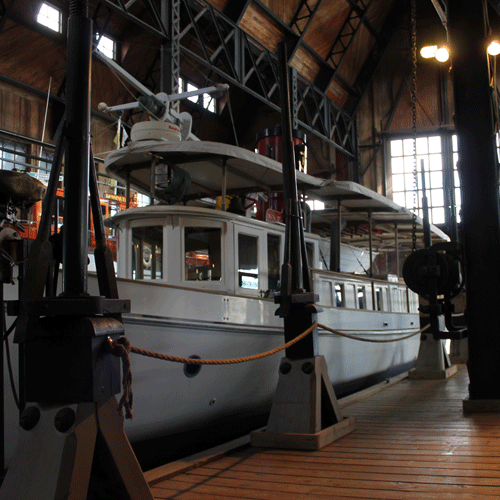Gibbons v. Ogden: The Commerce Clause
Historical
In Gibbons v. Ogden, 22 U.S. 1 (1824), the U.S. Supreme Court first held that Congress has the authority to regulate any form of commerce that crosses state lines. The opinion, authored by Chief Justice John Marshall, is considered the most influential regarding the Commerce Clause.
The Facts of the Case
The state of New York passed a law granting Robert R. Livingston and Robert Fulton the exclusive right to navigate the waters of the State with steamboats. Through an assignment, Aaron Ogden received the exclusive license to operate his steamboats in the waters between Elizabethtown, among other places in New Jersey, and the City of New York.
Ogden sought an injunction against Thomas Gibbons, who operated a steamboat along the same routes between New York and New Jersey. Gibbons possessed a coastal license granted under federal legislation, and his attorney, Daniel Webster, argued that Congress had exclusive authority to regulate interstate commerce under the U.S. Constitution. However, a New York court found Ogden and ordered Gibbons to cease operating his steamships. After the New York Supreme Court affirmed the decision, Gibbons appealed to the U.S. Supreme Court.
The Legal Background
Pursuant to Article 1, Section 8, Clause 3, of the Constitution, Congress is specifically empowered “to regulate Commerce with foreign Nations, and among several States, and with the Indian Tribes.” In basic terms, the Commerce Clause gives Congress exclusive authority over trade activities among the states and with foreign countries and Indian tribes. Meanwhile, states are free to regulate intrastate commerce that takes place exclusively within its borders. The Founding Fathers included the Commerce Clause in the Constitution to level the playing field between states with lucrative trading ports and those that were landlocked.
The Court’s Decision
The Supreme Court held that the New York law was unconstitutional as violating the Supremacy Clause, which establishes the U.S. Constitution and federal law as the “supreme law of the land.” According to the Court, the New York law was “in collision with the acts of Congress regulating the coasting trade, which, being made in pursuance of the Constitution, are supreme, and the State laws must yield to that supremacy, even though enacted in pursuance of powers acknowledged to remain in the States”.
In reaching its decision, the Supreme Court first interpreted the breadth and reach of the Commerce Clause. With regard to the definition of “commerce,” Chief Justice Marshall clarified that it extended to the regulations of navigation.
“The power to regulate; that is, to prescribe the rule by which commerce is to be governed. This power, like all others vested in Congress, is complete in itself and may be exercised to its utmost extent, and acknowledges no limitations, other than are prescribed in the Constitution,” he wrote. Accordingly, “The power of Congress, then, comprehends navigation, within the limits of every State in the Union; so far as that navigation may be, in any manner, connected with ‘commerce with foreign nations, or among the several States.’”
The Court also clarified the meaning of the phrase “commerce among the several States,” concluding that the word “among” should be interpreted as “intermingled with.” Accordingly, the Court held that Congress’ power to regulate interstate commerce does not “stop at the external boundary line of each State, but may be introduced into the interior.”
The Court also addressed the power of Congress, concluding that its authority to regulate commerce is plenary. As Chief Justice Marshall explained:
If, as has always been understood, the sovereignty of Congress, though limited to specified objects, is plenary as to those objects, the power over commerce with foreign nations and among the several states is vested in Congress as absolutely as it would be in a single government, having in its constitution the same restrictions on the exercise of the power as are found in the Constitution of the United States.
Taken together, Chief Justice Marshall’s broad interpretation of the Commerce Clause cemented Congress’ significant power to regulate all things impacting commercial activity that crosses state lines. Today, this integral clause of the U.S. Constitution serves as the basis for legislation governing everything from air quality standards to employee wages.
Previous Articles
Supreme Court Rejects Mexico’s Suit Against U.S. Gun Manufacturers
by DONALD SCARINCI on July 8, 2025
In Smith & Wesson Brands v. Estados Unidos Mexicanos, 605 U.S. ____ (2025), the U.S. Supreme Co...
SCOTUS Sides With Employee in Reverse Discrimination Case
by DONALD SCARINCI on July 2, 2025
In Ames v. Ohio Department of Youth Services, 605 U.S. ____ (2025), the U.S. Supreme Court held tha...
Supreme Court Rejects Moment of Threat Doctrine in Deadly Force Case
by DONALD SCARINCI on June 30, 2025
In Barnes v. Felix, 605 U.S. ____ (2025), the U.S. Supreme Court rejected the Fifth Circuit Court o...
The Amendments
-
Amendment1
- Establishment ClauseFree Exercise Clause
- Freedom of Speech
- Freedoms of Press
- Freedom of Assembly, and Petitition
-
Amendment2
- The Right to Bear Arms
-
Amendment4
- Unreasonable Searches and Seizures
-
Amendment5
- Due Process
- Eminent Domain
- Rights of Criminal Defendants
Preamble to the Bill of Rights
Congress of the United States begun and held at the City of New-York, on Wednesday the fourth of March, one thousand seven hundred and eighty nine.
THE Conventions of a number of the States, having at the time of their adopting the Constitution, expressed a desire, in order to prevent misconstruction or abuse of its powers, that further declaratory and restrictive clauses should be added: And as extending the ground of public confidence in the Government, will best ensure the beneficent ends of its institution.





